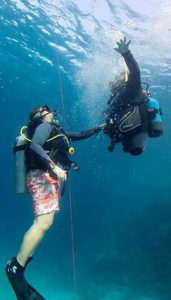 At Divecrew we try not to teach divers as a homogenous group. Everyone is different. So how did we get to the this point? Well first thing is we challenge some agencies as they tend to turn our “sheep” instructors. Instructors being professional should use a range of skills and techniques so that every diver student can be taught in comfort and safety. Working with Deptherapy and injured troops heightened our senses to the individual needs of the divers. The “sheep” mentality is challenged as to what is a technique and what is a standard. For example many instructors talk of a giant stride as a deep water entry. So what is the best entry for a student? The easiest! Simple. The standards state a deep water entry not a giant stride.
At Divecrew we try not to teach divers as a homogenous group. Everyone is different. So how did we get to the this point? Well first thing is we challenge some agencies as they tend to turn our “sheep” instructors. Instructors being professional should use a range of skills and techniques so that every diver student can be taught in comfort and safety. Working with Deptherapy and injured troops heightened our senses to the individual needs of the divers. The “sheep” mentality is challenged as to what is a technique and what is a standard. For example many instructors talk of a giant stride as a deep water entry. So what is the best entry for a student? The easiest! Simple. The standards state a deep water entry not a giant stride.
When working with the troops, some of whom have missing limbs, it is seen so often that instructors know best. Normally the instructors do not have limbs missing. Therefore, one cannot put themselves in that students place. Sometimes the instructor has to state the output and ask the student how they think they can best achieve it.
Divecrew have been fortunate to work with an autistic group. Many wrote the group off stating scuba was just too much for them. Wrong! The students completed their open water but a miraculous change happened. At the beginning the students were withdrawn. We struggled to get them to participate. Eventually the barriers went down. By the end of the training, the students were laughing and joking with the team. Their confidence went through the roof.
So do we deploy different tactics. Yes we do. Divecrew are multi-agency and believe no one agency has it completely right. PADI, SSI, RAID and BSAC. So what our senior instructors do is work with the agencies standards then add value to the course by supplementing skills and training techniques. Our speciality courses are enhanced giving any diver more value, more skills, more understanding. Once the senior team agree on a skill, the skill and technique is cascaded down through professional master classes. These free classes for Divecrew professionals teach skills, techniques and control. We discuss the psychology of scuba and students. Everything possible is undertaken to ensure our students re well trained and at all times feel safe. We undertake our own Quality Assurance through the senior professionals. So regardless of the course being taught, a Master Instructors may show up to observe. When we have new instructors, they must go through an internship. Unfortunately too many instructors believe once they have the ticket they have the right to teach. Some lapse into bad habits. Some become complacent. Some out of date and out of touch. Unlike some other sports, scuba instructors do not have to have annual assessments to ensure they are up to date and technically correct.
Divecrew believe agencies should do more to teach instructors adaptive methods and how to treat divers as individuals. The psychology of scuba should be a pivotal component in the instructor candidates development. Blindly following a set powerpoint and or a slate, is not conducive to teaching professionally. It makes a mockery of being “Professional Educators”.
So our advice. If your chosen dive centre do not treat you with respect and as an individual, find another dive centre.

